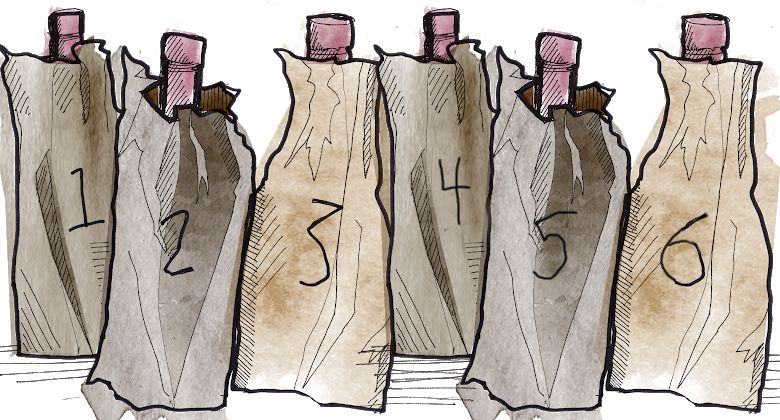Judgement Call
Wineries answer organized contests
Validation is a key component to the wine machine. On a basic level, consumers must like something before they shell out for it. On a more technical level, producers seek approval of those in the know, who issue valuable reviews, scores, awards and more.
The wine competition, almost as old as the industry itself, crowns certain releases as royalty while dismissing others. It’s a vast world that can be rewarding, frustrating, confusing or completely in the pockets of others. With such subjectivity, it’s tough knowing which competitions have real value and which miss the mark.
Smaller outfits appreciate the potential for brand awareness while more established labels plan to maintain a certain level of prestige. Sometimes, a competition across state lines is worthwhile, especially for a winery hoping to increase distribution and impress new clientele. Other times, it remains a matter of appeasing the trophy-thirsty crowd. You know the type: the guy (taster, distributor, buyer) who invests in something only with a proven, medal-wearing pedigree.
Some contests have accomplished great things for the American wine scene. There’s the Judgement of Paris, which drew international attention to American West Coast wine in 1976. Now legendary, it resembles stuff of movies and wine-soaked reflection among industry members. Or consider the Wine Olympics of 1979, turning attention toward our very own Oregon wine scene thanks to a ’75 Pinot from The Eyrie Vineyards.
There are countless lists, roundups and decorations bestowed by publications on wines and, increasingly, those wines are from Oregon. But the wine competition is its own kind of formal gathering, an event in which insiders meet specifically to offer opinions on a winery’s major labor. They can be as small as a sub-appellation or carry the kind of influence that traverses oceans and borders all over the globe.
Smaller-scale competitions — ones showcasing hobby productions or amateur wine — contain their own allure. The Oregon State Fair honors such a category and attracts numerous entries. The 2019 awards honored wine within a whole slew of categories, from peach and plum, to Petit Verdot and Viognier. The gold for reds went to Jim Shaw of Lake Oswego and his 2016 Willamette Valley Pinot Noir. Among white wines, the gold honored Paul Boyechko’s 2018 Yakima Valley Viognier.
Approval frequently comes at a cost. Many of these competitions require multiple samples as well as entry fees, which commonly exceed $100, not to mention the long delay between submitting and scores or awards announced.
Artists have coveted critical acclaim for ages, whether for an emerging band pushing for a multi-star rating from Rolling Stone or a Broadway performer chasing a Tony. This fascinating world within a world wields a fair amount of influence. These days, with so much digital jabber, every soul with a Wi-Fi connection claims to be a critic. Which is why getting a real sample of wine before the noses and mouths of genuine people with at least some training can be precious. Even more so if they’re engaging in a truly blind tasting, for objectivity’s sake.
In the sidebar, find some of the most prominent competitions in the American wine landscape. Local contests connected to festivals include McMinnville Food & Wine Classic — SIP!, Astoria Warrenton Crab & Seafood Festival, Oregon Wine Experience, First Taste Oregon and more.
San Francisco Chronicle Wine Competition
The largest tasting for North American wines happens every January. This year’s event was overseen by 65 judges from coast to coast, including wine journalists, authors, columnists, vintners, wine directors, sommeliers and others. Some 6,700 wines were examined from more than 1,000 wineries.
L.A. International Wine Competition
Turning 81 years old in 2020, this true blind tasting is part of the L.A. County Fair each May. As of 2002, the vast competition has welcomed wines from all over the planet and judged by a panel of around 70 industry types. Being affiliated with the fair, the competition boasts a strong public education component, complete with courses and tastings.
Somm’s Choice Awards
Another San Francisco-based competition, this year’s Somm’s Choice Awards occurs in May. The main winery draw is getting wine before an esteemed group of around 30 sommeliers, buyers and wine directors. It’s put on by the Beverage Trade Network, and as the site suggests, the main question the judges address is: “Would we stock this?”
TexSom
Evaluating wines from around the world, TexSom’s International Wine Awards is an extension of the annual wine trade conference held in Dallas. Convening in February, the judges split into panels of four during the blind tastings. There are scores of awards, with the typical platinum, gold, silver and bronze spread, in addition to “Judges’ Selection” categories.
Sunset Magazine International Wine Competition
In 2019, judges explored 2,700 wines during the eighth annual installment. The decision-makers are a mashup of winemakers, industry writers and wine educators. A subsequent autumn issue of the magazine, typically October, publishes the winners.
New York International Wine Competition
More of a mid-sized contest, this event attracts around 1,500 wine entries. NYIWC is draw for labels looking to market out of country, with winners being exposed to a lineup of international importers. Small panels of trade-only judges gauge and award wine from a retail perspective.
American Wine Society Amateur Wine Competition
This amateur competition offers, essentially, the same approach as a commercial affair. Trade types, often certified by the AWS, judge the wines and offer written commentary or suggestions for improvement. Last year’s competition took place in Florida and weighed submissions from all over the country.
Oregon Wine Awards
Billed as the state’s largest wine recognition program for wine, fruit wine and saké, the Oregon Wine Awards ranks as one of the newest out there. A judging panel of more than two dozen Northwest wine pros assesses wines from the state according to a 200-point scoring scheme.











